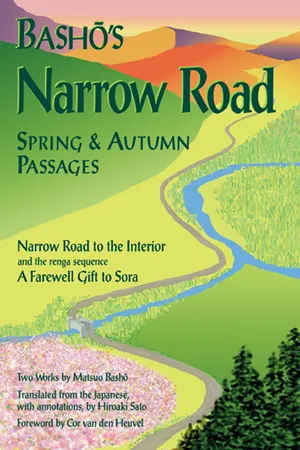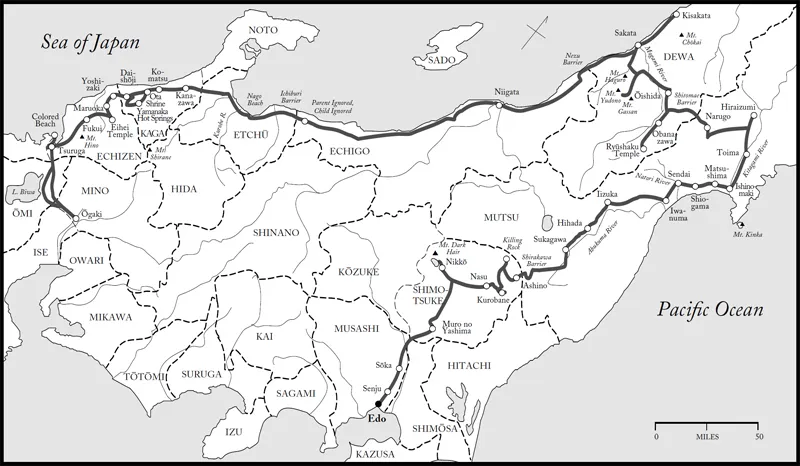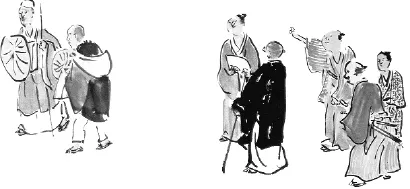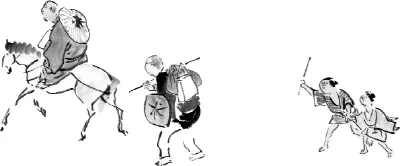![]()
Narrow Road to the Interior
![]()
BASHŌ’S ROUTE, WITH MAJOR STOPPING PLACES
![]()
NARROW ROAD TO THE INTERIOR
THE MONTHS AND DAYS ARE WAYFARERS OF A HUNdred generations, and the years that come and go are also travelers.1 Those who float all their lives on a boat or reach their old age leading a horse by the bit make travel out of each day and inhabit travel. Many in the past also died while traveling.2 In which year it was I do not recall, but I, too, began to be lured by the wind like a fragmentary cloud and have since been unable to resist wanderlust, roaming out to the seashores. Last fall, I swept aside old cobwebs in my dilapidated hut in Fukagawa,3 and soon the year came to a close; as spring began and haze rose in the sky, I longed to walk beyond Shirakawa Barrier4 and, possessed and deranged by the distracting deity5 and enticed by the guardian deity of the road, I was unable to concentrate on anything. In the end I mended the rips in my pants, replaced hat strings, and, the moment I gave a moxa treatment to my kneecaps, I thought of the moon over Matsushima.6 I gave my living quarters to someone and moved into Sampū’s villa:
Kusa no to mo sumi-kawaru yo zo hina no ie
In my grass hut the residents change: now a dolls’ house7
I left the first eight links hung on a post of my hut.8
ON THE TWENTY-SEVENTH OF THE THIRD MONTH,9 the daybreak sky was suffused with haze; even though the moon at dawn loses much of its light,10 the peak of Fuji was faintly visible, and I was uncertain when again11 I might see the flowering treetops of Ueno and Yanaka. My close friends, who had been gathered since the previous evening, sent me off in a boat. When we climbed out of the boat at a place called Senju, I was depressed by the thought of the three thousand li that lay ahead12 and shed tears at a parting in this illusory world.
Yuku haru ya tori naki uo no me wa namida
Departing spring: birds cry and, in the eyes of fish, tears13
This was the first time I used my travel writing implements, and I was still reluctant to venture farther. My friends lined up along the road, apparently to keep watching us as long as they could see us.
THIS YEAR, THE SECOND YEAR OF GENROKU IT MUST be,14 I casually thought of making a pilgrimage over a long road to Ōshū15 and, even while realizing that I could end up regretting my hair turning white under the sky of Wu,16 I gambled on the slim, uncertain chance of returning alive from a place of which I had heard but hadn’t seen with my own eyes. And the day we left, we managed to reach the station called Sōka. The things that I had hung over my thin-boned shoulders tormented me first. Although I had left with practically nothing, there were things like a paper-garment17 to keep me from night’s cold, a yukata,18 rainwear, and ink and brushes, in addition to which were the farewell gifts I was unable to decline. I was unable to discard them, either, and had to resign myself to their becoming a burden on the road.19
Setting off.
WE PAID OUR RESPECTS TO MURO NO YASHIMA.20 Sora, my companion on the road, said: “The deity here is called Princess-to-make-trees-bloom and is also enshrined on Fuji.21 This is called Muro no Yashima because she shut herself up in a doorless chamber and vowed to burn herself, but in the midst of that act gave birth to Prince-fire-out.22 It is also because of this that it is customary to mention smoke in a poem about this place.”23 Again, local history has it that catching the fish called konoshiro24 is banned.
ON THE THIRTIETH WE STAYED AT THE FOOT OF Mount Nikkō.25 The inn proprietor said, “My name is Buddha Gozaemon. Because my principle is to be honest in everything, people call me that. Please feel completely relaxed on your grass pillow and have a good rest.” Wondering what kind of Buddha manifested himself in this world of mud and dust to help someone like me, who resembled a Buddhist mendicant or a pilgrim, I observed the proprietor’s behavior with some care and found him to be simply unwise and undiscriminating,26 a man of honesty incarnate. It was like strong will and blunt simplicity approaching ultimate humanity.27 His innate clarity of mind should be highly valued.
ON THE FIRST DAY OF THE FOURTH MONTH, WE PAID our respects to The Mountain.28 In ancient times the name of this mountain used to be written to read Futarasan (Mount Two Disasters),29 but when the Great Teacher Kūkai30 founded the temple, he changed it to Nikkō (Sunlight). He must have foreseen the future a thousand years ahead: today the light from this place illuminates the entire heaven, its beneficence fills the whole land, and the easeful home for all four classes of people is peaceful. Awestruck, I was barely able to take up my brush:
Ara tōto aoba wakaba no hi no hikari
Look, so holy: green leaves young leaves in the light of the sun31
MOUNT DARK HAIR32 HAD HAZE AROUND IT, ITS snow still white.
—SORA
Sori-sutete Kurokami-yama ni koromogae33
Shaving off the dark hair mountain and clothes changed
Sora is from the Kawai family; his common name is Sōgorō. With our eaves side by side under the lower leaves of plantain,34 he helps me in the labor of acquiring firewood and water.35 This time he was delighted to share with me the views of Matsushima and Kisakata;36 at the same time, to console me for the hardship of traveling, on the day he left for this journey he shaved his hair, changed his appearance to that of one in an ink-dyed robe, and revised the characters of his name from sōgo (all five) to sōgo (religious enlightenment). This is why he came up with the piece on Mount Dark Hair.37 The two-character word koromogae sounds powerful.
We climbed the mountain for more than two thousand yards and came to a waterfall. Flying down a hundred feet from the top of a rocky cavern, it drops into an azure pool surrounded with a thousand rocks. I’ve heard it said that since you can put yourself in the cave and look at the waterfall from behind, it is called the Back-view Waterfall.
On the road near Nasu.
Shibaraku wa taki ni komoru ya ge no hajime38
Confining ourselves in a waterfall a while in early summer
BECAUSE WE HAD AN ACQUAINTANCE AT A PLACE called Kurobane,39 in Nasu, we decided to take a straight path there through the wild field that opened up before us. Aiming at a village in the distance, we kept going, but it started to rain and dusk fell. We borrowed space at a farmer’s house for the night40 and as soon as the day broke we resumed our walk through the field. There was a horse being pastured. We pleaded with a man who was cutting grass,41 and the man, though a rust...





